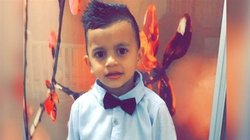 Israeli forces have summoned a four-year-old Palestinian child from the occupied East Jerusalem al-Quds neighborhood of al-Issawiya after charging him with throwing stones at a military vehicle.
Israeli forces have summoned a four-year-old Palestinian child from the occupied East Jerusalem al-Quds neighborhood of al-Issawiya after charging him with throwing stones at a military vehicle. RNA - On Monday, a large number of police forces stormed the neighborhood in order to capture the child, identified as Mohammad Rabiaa Elayyan.
They chased the child and when members from his family showed up, they were handed a warrant ordering them to bring him to the Israeli police station on Salaheddine Street for interrogation.
Mohammad and his father Rabiaa went to the Israeli police station on Tuesday morning, accompanied by fellow residents of Issawiya, who came to protest the interrogation warrant.
Palestine's official WAFA news agency reported that Rabiaa was briefly interrogated by Israeli police, and released shortly thereafter.
The Wadi Hilweh Information Center – Silwan also posted a video, showing the four-year-old Palestinian child crying as he is carried by his father, who enters the police station.
Qadri Abu Bakr, chairman of the Commission of Detainees’ and Ex-Detainees’ Affairs, later denounced the Israeli police for summonsing the four-year-old Palestinian child for interrogation.
Abu Baker, in a post published on his Facebook page, slammed the Israeli regime for committing flagrant crimes against Palestinian minors and children.
“The Palestinian childhood is in serious and constant danger while the international community keeps silent on Israel’s violations,” he wrote.
Israeli police spokesman Micky Rosenfeld described the summoning as a “standard procedure,” adding, “It’s an educational process and at the same time community policing to deal with that incident.”
He went on to say that no police officers were injured in the alleged stone-throwing incident involving Mohammad.
Jawad Siam, director of the Wadi Hilweh Information Center – Silwan, said the interrogation summons are part of a broader policy to exert pressure on Issawiya's residents.
“It’s a way to put pressure on the family, on the people. They know they cannot arrest them, they cannot put them in jail - but it’s a kind of terror against the children,” he commented.
Siyam said residents of Issawiya have been under a lot of pressure to stop their acts of protest against regular raids and arrests by the Israeli army and police, and frequent home demolitions.
“It’s collective punishment against Issawiya. They want people there to give up to police. But the fact is that people do not want to welcome the police.
“It will not work. Especially after the killing of Mohammad Obaid, the village exploded much more than before. And still they’ve put pressure, they’ve put checkpoints, tickets, collective punishment. They think that if they teach [Issawiya residents] how to punish the children, they will also learn,” he said.
847/940